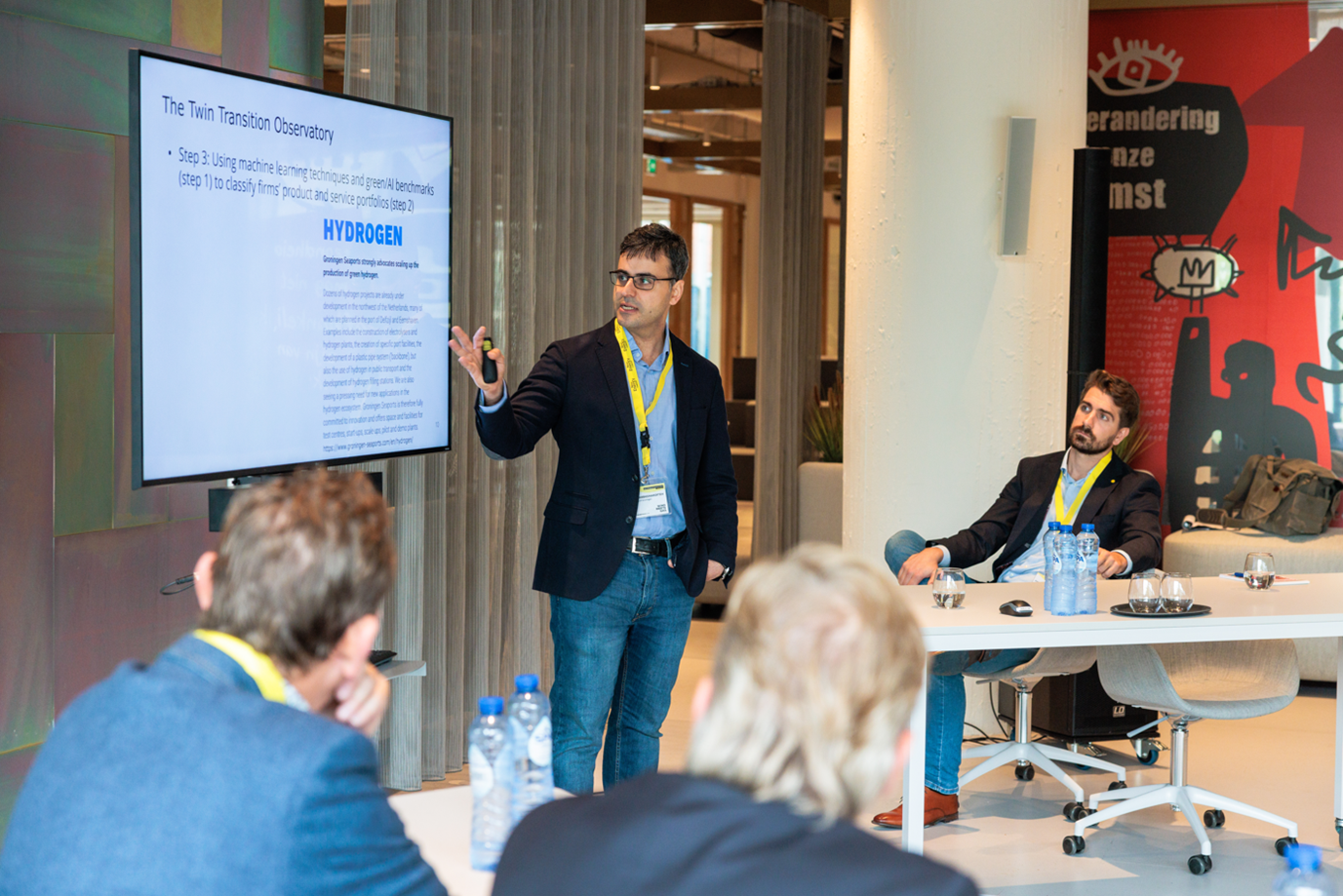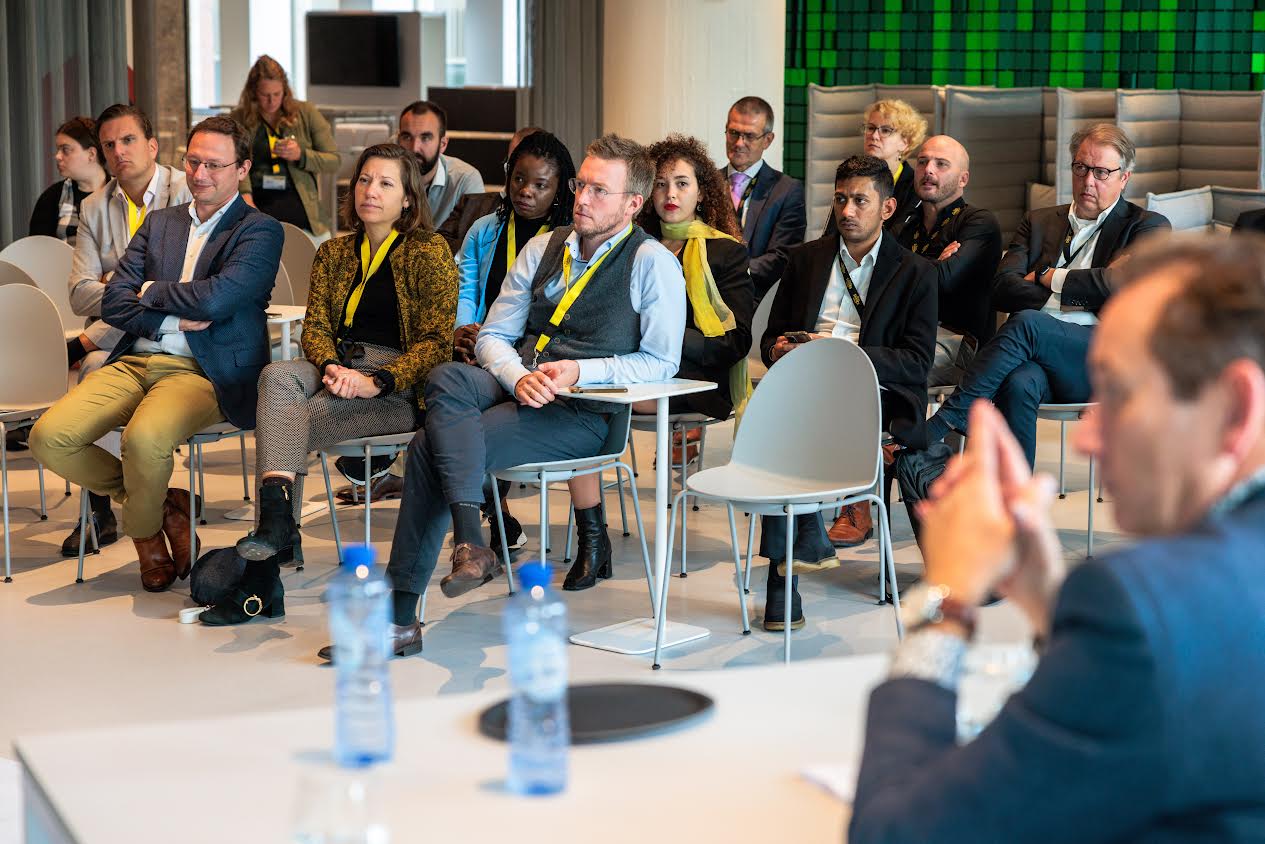Wind meets Gas Symposium: ‘We have a good ecosystem, but the focus could be better'
How do we create a successful ecosystem for energy startups in the North? This question was at the centre of a session last Friday at the House of Connections, organised by the Wubbo Ockels School for Energy and Climate, as part of the seventh edition of the international symposium 'Wind meets Gas'. A few answers: a central meeting place for start-ups, more focus on the implementation of innovations and a fifth technical university in Groningen.
Milad Abbasiharofteh, Assistant Professor at the University of Groningen(UG), kicked off the meeting with a short presentation. He studied the use of hydrogen trademarks by companies in the North of the Netherlands. Is the word hydrogen, or a related term, registered as a trademark, or does it appear on companies' websites or social media as a trademarked term? Such a trademark indicates whether an innovation is actually brought to the market. Using data analysis with AI, Abbasiharofteh concluded that no trademarks related to hydrogen can be attributed to companies from the North (Groningen, Friesland, Drenthe) over the past five years.
A thought-provoking observation, especially for Groningen as the envisioned hydrogen capital of Europe. Abbasiharofteh's findings immediately led to many questions from the audience. With this, the tone was set for the central discussion entitled 'Energizing the entrepreneurial ecosystem for the energy transition'. Aniek Ouendag, impact officer entrepreneurship at the UG, led the debate. She presented the five-member panel of experts on the energy transition in the North with a number of questions. 'Is there enough focus on the energy transition in our current ecosystem for entrepreneurs?', Ouendag wanted to know.
Fragmented
'No,' was the short answer from panel member Eric Lücke (Rabobank). According to him, start-ups are successful when they join forces and cooperate with each other. But this requires a central meeting place, and this location is currently lacking in the North, Lücke noted. Roel Swierenga, from the Investment and Development Agency for the Northern Netherlands (NOM), joined him. He too insisted on more cooperation. 'There is a good working ecosystem, the facilities, tools and money are there. There are plenty of options: startups can use 40 funds. But the focus on energy transition could be better. At the moment, it is too fragmented.'
According to Philo Tamis of the New Energy Coalition (NEC), the product of the startups is not the problem. It's the implementation that regularly fails. 'Often a good business model is lacking.' A field research by the New Energy Coalition shows that startups need a place where they can meet. 'That would be very beneficial. It's about a place where someone with a technical background meets an entrepreneur with an economic background, and vice versa, potentially leading to collaboration.'



Knowledge institutions
Panel member Jörg Gigler, managing director at TKI New Gas, also recognised that things usually tend to go wrong during implementation. 'In the Netherlands, we are very good at research & development (R&D), but we are less good at transforming this knowledge into business. That requires a different mindset, a different culture.' According to him, universities and hbo’s (universities of applied sciences) should focus more on entrepreneurship. 'Teach students where to find support when they launch a startup, and how to make a business 'bankable'.'
Swierenga endorsed this observation. 'The quality of startups is often not good enough. This also has to do with the way of training, and in this the university plays an important role. The theoretical knowledge acquired often has little to do with reality. Too little attention is paid to the business plan, to the story of the startup.'
A participant from the audience agreed. 'I did the master's in Small Business and Entrepreneurship at the UG. I expected to learn how to build a startup. But this practical focus was missing. The focus was on theory.' There is another problem, added another participant from the audience. 'Universities demand part of the IP (intellectual property, ed.) of startups that used the institution's facilities. Investors don't like that.'
Human capital
What about human capital, moderator Ouendag wanted to know. She clearly touched a nerve. 'There is a mismatch between what schools and universities teach and what industries need in the field of energy transition,' Swierenga responded. 'The demand for skilled people is tremendous. But you cannot learn how to build a wind turbine on the open sea anywhere here. For that, you have to go to Norway. I therefore plea for Groningen to become the fifth technical university.'
Moreover, there is a shortage of young people, Gigler added. 'We should be careful not to cannibalise each other in the coming years. What use is it to the Netherlands if we attract talent from Eindhoven to the North? That's why we have to look at migration, although that's nearly a political discussion. We just need students from outside the Netherlands.'
Supply and demand
Back to the startups. 'The proof of the pudding is in the eating,' argued an audience participant. 'It's ultimately about the consumer: where is the demand? Who is going to use it?' With hydrogen, that is where a problem arises, Swierenga responded. The market demands large-scale, complex solutions, which only startups cannot deliver. 'It is a capital-intensive industry. Young startups don't have much capital. The question is: how can we bridge this? We try this, for example, with 'startup challenges', in which large companies present problems. This is then taken up by startups.'
On the demand side, it's about a culture change, an audience participant responded. 'When it comes to hydrogen, companies have no idea where to start. There is a lack of knowledge among these customers. We need to educate people about hydrogen. There is a lot of interest. The egg is there - the innovations are in place - we just need to work on the chicken,' the conference attendee concluded.
Wind meets Gas was organised by the New Energy Coalition , a network of knowledge institutions, companies, governments and NGOs working together on the energy transition. The international symposium took place on 12 and 13 October at the Martinikerk in Groningen.
| Last modified: | 17 October 2023 5.20 p.m. |
More news
-
24 March 2025
UG 28th in World's Most International Universities 2025 rankings
The University of Groningen has been ranked 28th in the World's Most International Universities 2025 by Times Higher Education. With this, the UG leaves behind institutions such as MIT and Harvard. The 28th place marks an increase of five places: in...
-
05 March 2025
Women in Science
The UG celebrates International Women’s Day with a special photo series: Women in Science.
-
16 December 2024
Jouke de Vries: ‘The University will have to be flexible’
2024 was a festive year for the University of Groningen. In this podcast, Jouke de Vries, the chair of the Executive Board, looks back.

